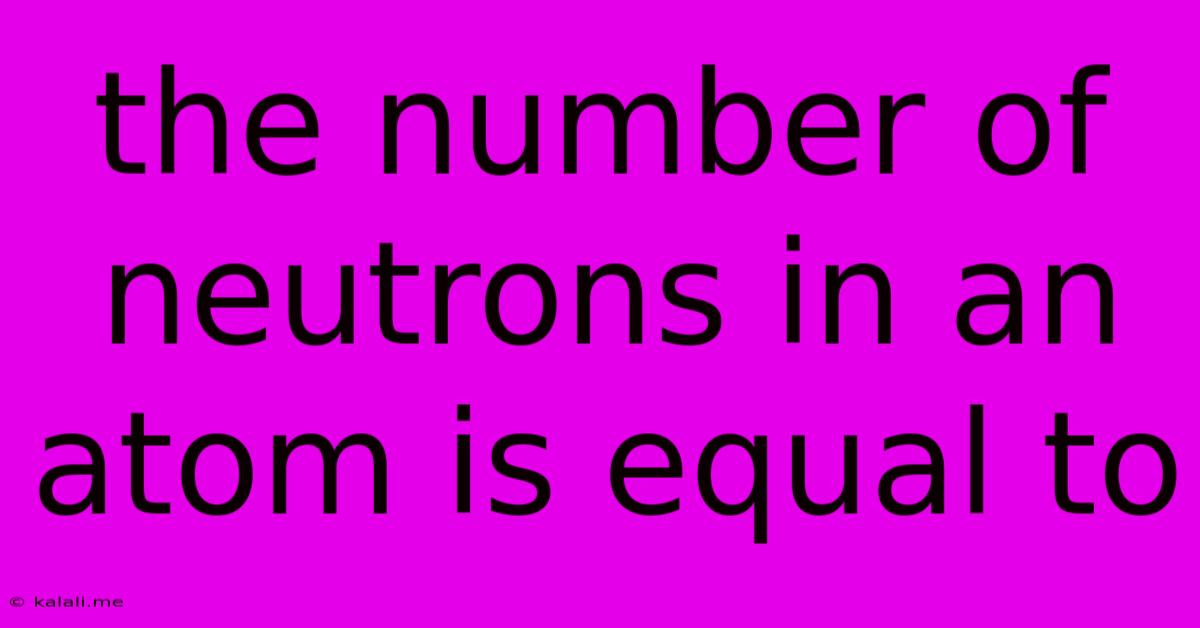The Number Of Neutrons In An Atom Is Equal To
Kalali
Jun 12, 2025 · 3 min read

Table of Contents
The Number of Neutrons in an Atom is Equal To: Understanding Atomic Structure
Understanding the number of neutrons in an atom is crucial to grasping the fundamentals of chemistry and physics. This article will delve into the relationship between neutrons, protons, and the atomic mass number, explaining how to determine the neutron count for any given atom. We'll also explore isotopes and their significance in understanding the behavior of elements.
What Determines the Number of Neutrons?
The number of neutrons in an atom isn't independently defined like the number of protons (which determines the element). Instead, it's calculated using the atomic mass number (A) and the atomic number (Z).
-
Atomic Number (Z): This represents the number of protons in the atom's nucleus and uniquely identifies the element. For example, hydrogen has an atomic number of 1, carbon has 6, and oxygen has 8.
-
Atomic Mass Number (A): This represents the total number of protons and neutrons in the atom's nucleus. It's essentially the total mass of the nucleus, with protons and neutrons each contributing approximately one atomic mass unit (amu).
Therefore, the number of neutrons (N) in an atom can be calculated using the following simple formula:
N = A - Z
Example:
Let's consider carbon-12 (¹²C). Carbon's atomic number (Z) is 6. The '12' in ¹²C represents its atomic mass number (A). Using the formula:
N = 12 - 6 = 6
Therefore, a carbon-12 atom has 6 neutrons.
Isotopes and Neutron Variation:
Atoms of the same element can have different numbers of neutrons. These variations are called isotopes. They have the same number of protons (and thus the same atomic number), but a different number of neutrons, resulting in different atomic mass numbers.
For instance, carbon has several isotopes:
- ¹²C (Carbon-12): 6 protons, 6 neutrons
- ¹³C (Carbon-13): 6 protons, 7 neutrons
- ¹⁴C (Carbon-14): 6 protons, 8 neutrons
These isotopes behave similarly chemically because they have the same number of electrons and protons, influencing their chemical bonding. However, their different neutron numbers can affect their physical properties, such as their stability and radioactivity (as seen with Carbon-14, a radioactive isotope used in carbon dating).
Significance of Neutron Number:
The number of neutrons significantly impacts an atom's:
-
Stability: The neutron-to-proton ratio plays a critical role in nuclear stability. Too many or too few neutrons can lead to radioactive decay.
-
Mass: Neutrons contribute significantly to the overall mass of an atom, as they have a mass approximately equal to that of a proton.
-
Nuclear Reactions: The number of neutrons influences how an atom participates in nuclear reactions, such as fission and fusion.
In Conclusion:
The number of neutrons in an atom is not an independent property but is directly related to the atomic mass number and the atomic number. Understanding this relationship is fundamental to comprehending atomic structure, isotopes, and nuclear behavior. The simple formula, N = A - Z, provides a straightforward method to determine the number of neutrons in any given atom. This knowledge is crucial across various scientific disciplines, from chemistry and physics to nuclear engineering and medicine.
Latest Posts
Latest Posts
-
Which Of The Following Substances Is A Compound
Jun 13, 2025
-
What Is The Next Number 0 3 8 15
Jun 13, 2025
-
How Many Atoms Are In O
Jun 13, 2025
-
How Far Would The Nurse Depress The Lower Sternum
Jun 13, 2025
-
In The Figure Line M Is Parallel To Line N
Jun 13, 2025
Related Post
Thank you for visiting our website which covers about The Number Of Neutrons In An Atom Is Equal To . We hope the information provided has been useful to you. Feel free to contact us if you have any questions or need further assistance. See you next time and don't miss to bookmark.